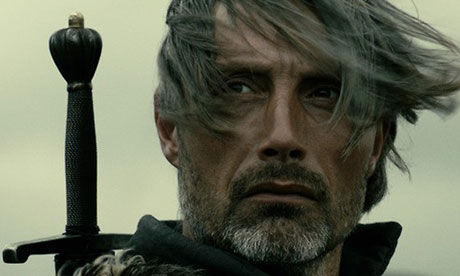
Here is a handsomely-made and admirably high-minded revenge movie, set in 16th century France, that paints its world in glowing, vivid colours, but is rather too much in love with its leading man, Mads Mikkelsen, to achieve the epic grandeur it is aiming at. It is directed by Arnaud des Pallières, making his first visit to the Cannes competition with his fourth feature, and is adapted from the novella by Heinrich von Kleist, with the action transposed from Reformation-era Saxony to the mountainous Cévennes region of France.
Des Pallières' film follows the original fairly closely: Mikkelsen plays a horse trader who is badly treated by a local baron; his attempt to gain legal redress over two illegally-held horses and a beating of his servant is thwarted by the baron's influence at court. After his wife is killed, and fanatically attached to the principle of justice, Kolhaas takes up arms and gradually amasses a rebel army that threatens the state; only then are his grievances addressed.
Mikkelsen cuts quite a dash in the role of a wronged man filled to the brim with noble suffering; his razor-sharp cheekbones are almost as lethal a weapon as the giant sword he slings on his back. And des Pallières has a fine eye for the rough-hewn physicality of the period; the clanking metal of the weaponry, the squeaking wooden axles of the carts, the ragged homespun fabric of the clothing. He also comes up with some rather brilliantly staged sequences: a raid on a baronial fortress by Kolhaas and his crossbowmen; a curious visit by youthful princess Marguerite that catches hunky Mads in the bath; an intriguing scene where Kolhaas is criticised by a charismatic clergyman played by Denis Lavant.
But for a story that seeks to remind us of the harshness of pre-modern life, the whole is very emotionally soft-focus: after his impossibly idyllic lifestyle is interrupted, Mikkelsen's performance is essentially a single-note affair: intense burning nobility. The pace, however, struggles to rise above ponderousness, and the film is not helped eitherby abrupt time jumps in the narrative that leave the viewer floundering for no particular reason; they're a baffling formal device in what is essentially a western reconfigured around the Wars of Religion. By sticking to his source, des Pallières ensures his film has substance, and he adds plenty of visual style. But it remains at a plod, when it should canter.

